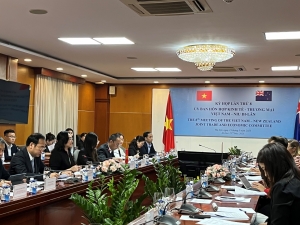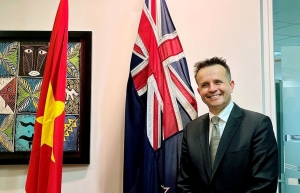New Zealand seeks to level up wide-ranging trade
What are the key sectors that the two countries can increase trading and investment in the coming future?
 |
| New Zealand’s Deputy Secretary of Foreign Affairs and Trade, Vangelis Vitalis |
The thing that we need to do is to think imaginatively about some of the opportunities that exist. For New Zealand, it’s not just exporting meat products and dairy products and some fruit to Vietnam, and regarding Vietnam, it’s not just a case of sending limes and pomelo. We’ve got to think of the future, and I think the future is in services trade.
For example, New Zealand is sending software for health management to Vietnamese hospitals. Vietnam is a major powerhouse of construction engineering, and as part of the ASEAN-Australia-New Zealand Free Trade Agreement, New Zealand committed to giving 100 places for Vietnamese engineers to come and work in New Zealand.
This is the future of our relationship. It’s the high quality of the services sector, where the real growth will lie in our relationship.
What about the potential collaboration in terms of education?
That’s a big area of economic opportunity for both sides. Having the privilege of speaking to the National Economic University, I was struck by the quality of the questions, but also the engagement of students, and this is the future we have in terms of special education relationships. For example, Waikato University in New Zealand has a special relationship with National Economic University.
In addition, Massey University in New Zealand has a number of programmes and courses which develop competencies relevant to operating small- and medium-sized enterprises and entrepreneurship. There are important places for the quality of education we can supply at a reasonable price, but a very high-quality product.
It’s not a coincidence that when New Zealand’s former Prime Minister Jacinda Ardern was in Vietnam in November, she and Prime Minister Pham Minh Chinh witnessed the re-signing of the Education Cooperation Agreement between the Vietnamese Ministry of Education and Training and the New Zealand Ministry of Education.
Accordingly, the two sides will continue to make efforts to strengthen, promote, and develop cooperation in education on the basis of mutual benefits and expand cooperation fields, from preschool education and higher education to national training frameworks and English language training.
A part of the agenda was an education roundtable, where representatives of the two countries exchanged many related experiences, including in institutional autonomy, enhancing the impact of the two parties’ government scholarships, and investment and collaboration in international education.
At present, a lot of New Zealand companies are investing in Vietnam. How do they evaluate the investment environments in Vietnam?
It’s an environment that’s getting more competitive. We face lots of competition from others from Australia, from the United Kingdom from the EU, and so there’s lots of competition here because everyone wants to be in Vietnam.
But New Zealand also knows it has got to be better than the others to make sure that we can be big investors here in Vietnam. We’re never going to be the biggest in all parts of the Vietnamese economy, but we can be decent investors in high-quality agriculture, climate change, healthcare services, and education services.
These are the areas where New Zealand can make a big contribution that is good for Vietnam, but also good for my country as well.
 | New Zealand and Vietnam agree to boost trade and investment cooperation New Zealand and Vietnam have agreed to increase their trade cooperation and reduce barriers, with the goal of raising bilateral trade turnover to $2 billion by 2024. |
 | New Zealand and Vietnam offering trade solutions The latest meeting of the Vietnam-New Zealand Joint Economic and Trade Committee took place in Hanoi last week, with promises to boost cooperation in trade and reduce trade barriers. New Zealand’s Deputy Secretary of Foreign Affairs and Trade, Vangelis Vitalis, talked to VIR’s Kim Oanh about the potential of bilateral cooperation and proposals to realise trade turnover targets. |
What the stars mean:
★ Poor ★ ★ Promising ★★★ Good ★★★★ Very good ★★★★★ Exceptional
Related Contents
Latest News
More News
- Hermes joins Long Thanh cargo terminal development (February 04, 2026 | 15:59)
- SCG enhances production and distribution in Vietnam (February 04, 2026 | 08:00)
- UNIVACCO strengthens Asia expansion with Vietnam facility (February 03, 2026 | 08:00)
- Cai Mep Ha Port project wins approval with $1.95bn investment (February 02, 2026 | 16:17)
- Repositioning Vietnam in Asia’s manufacturing race (February 02, 2026 | 16:00)
- Manufacturing growth remains solid in early 2026 (February 02, 2026 | 15:28)
- Navigating venture capital trends across the continent (February 02, 2026 | 14:00)
- Motivations to achieve high growth (February 02, 2026 | 11:00)
- Capacity and regulations among British areas of expertise in IFCs (February 02, 2026 | 09:09)
- Transition underway in German investment across Vietnam (February 02, 2026 | 08:00)

 Tag:
Tag:




















 Mobile Version
Mobile Version